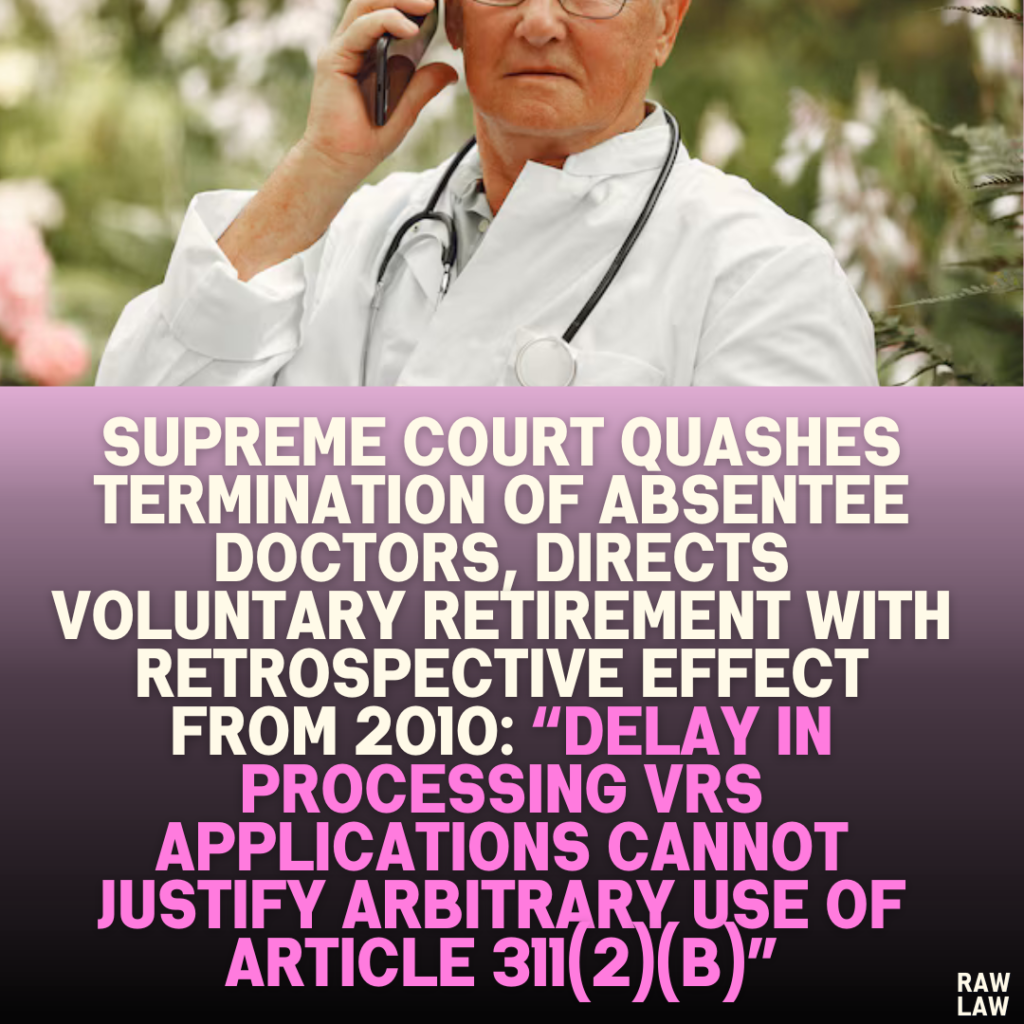Court’s Decision
The Supreme Court of India quashed the termination orders passed by the State of Uttar Pradesh against doctors who had applied for Voluntary Retirement Scheme (VRS) but remained absent from duty for extended periods. The Court ruled that these doctors should be treated as voluntarily retired from service effective May 3, 2010. It substituted the termination orders with VRS orders under Article 142 of the Constitution to ensure complete justice. However, the Court denied arrears of salary or pension before this judgment while allowing pension refixation based on the voluntary retirement date. The State was directed to process these benefits within three months.
Facts
- Respondents’ Service Details:
- The respondents were medical professionals employed by the State of Uttar Pradesh.
- They applied for VRS on various dates: January 5, 2008, October 6, 2008, and December 7, 2006, respectively.
- State’s Actions:
- The State did not act on these VRS applications for an extended period.
- On May 3, 2010, the respondents, along with over 400 other medical officers, were terminated from service under Article 311(2)(b) of the Constitution, citing impracticability of conducting a disciplinary inquiry due to large-scale absenteeism.
- High Court’s Ruling:
- The Allahabad High Court set aside the termination orders, directed the State to reinstate the respondents with consequential benefits, and mandated the consideration of pending VRS applications.
Issues
- Whether the State’s termination of the respondents under Article 311(2)(b) of the Constitution was valid.
- Whether the High Court’s order of reinstatement with consequential benefits was appropriate.
- Whether the delay in processing the respondents’ VRS applications justified their absenteeism and rendered the termination invalid.
Petitioner’s Arguments (State)
- Absenteeism: The respondents remained absent for prolonged periods without authorization, which justified termination.
- Impracticability of Inquiry: Large-scale absenteeism by thousands of medical officers made disciplinary proceedings impracticable, warranting action under Article 311(2)(b).
- Error in High Court Order: Reinstating employees who abandoned their duties set a wrong precedent. The High Court ignored the respondents’ misconduct in its judgment.
Respondent’s Arguments (Doctors)
- State’s Delay: The respondents contended that their prolonged absenteeism was the result of frustration over the State’s unreasonable delay in deciding their VRS applications.
- Non-Communication of Decisions: The State failed to communicate any decision regarding their VRS applications, which caused ambiguity about their employment status.
- Invalid Termination: They argued that the termination orders under Article 311(2)(b) were arbitrary and unwarranted as there was no evidence of impracticability in conducting disciplinary inquiries.
Analysis of the Law
- Article 311(2)(b): This provision allows termination without a disciplinary inquiry when holding such an inquiry is impracticable. However, the Court emphasized that the State must provide concrete justification for its invocation.
- Failure to Act on VRS Applications: The Court found that the State failed to explain why the respondents’ VRS applications were left pending for an unreasonable period.
- Balance of Conduct and Justice: The respondents’ absenteeism was noted as inappropriate, but the State’s delay in addressing VRS applications contributed significantly to the dispute.
Precedent Analysis
The Court referred to principles of service law, particularly emphasizing the requirement for procedural fairness under Article 311. It reinforced that the State cannot rely on vague assertions of impracticability to bypass procedural safeguards. Instead, such assertions must be substantiated with evidence.
Court’s Reasoning
- Delay in Deciding VRS: The Court criticized the State for leaving the VRS applications undecided, stating:
- “No reasons are forthcoming…for keeping the applications pending for such a long time.”
- Respondents’ Conduct: While absenteeism was improper, the Court held that reinstatement was not appropriate given the prolonged absence.
- Equitable Remedy:
- The Court ruled that terminating the respondents outright was unjustified.
- However, reinstatement with full benefits was also inappropriate.
Conclusion
The Court issued the following directives:
- Quashing Termination Orders: The termination orders dated May 3, 2010, were set aside.
- Voluntary Retirement Granted: The respondents were deemed to have voluntarily retired effective May 3, 2010.
- Monetary Benefits:
- No arrears of salary or pension were awarded for the period prior to this judgment.
- Pension refixation based on the date of voluntary retirement was allowed, with pension payments starting from the date of this judgment.
- Implementation Timeline: The State was directed to release monetary benefits, including refixed pension, within three months.
Implications
- Fairness in Service Law: The judgment underscores that procedural fairness must be followed in disciplinary and administrative actions, and arbitrary reliance on Article 311(2)(b) is not acceptable.
- Timely Action on VRS Applications: The State’s failure to process VRS applications promptly highlighted administrative inefficiency and caused unnecessary litigation.
- Balancing Justice: The Court’s approach demonstrates a balanced remedy, ensuring fairness to employees while recognizing their misconduct.
This judgment provides a significant precedent on balancing procedural lapses by the employer with the employees’ obligations under service law. It also clarifies the scope of Article 311(2)(b), ensuring its careful application in future cases.




Pingback: Delhi High Court Reclassifies Conviction Under POCSO Act: "No Evidence of Penetration; Conviction Reduced to Sexual Assault and Assault to Disrobe" - Raw Law
Pingback: Delhi High Court Acquits Accused Under POCSO Act: “The Leap from Physical Relations to Sexual Assault Must Be Proven,” Cites Insufficient Evidence and Survivor’s Testimony Inconsistencies - Raw Law